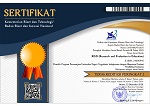A construct of the instrument for measuring junior high school mathematics teacher's self-efficacy
DOI:
https://doi.org/10.21831/reid.v3i1.13559Keywords:
self-efficacy, construct, mathematics, junior high schoolAbstract
The aim of this study was to develop a construct of the instrument for junior high school mathematics teacher self-efficacy and its mapping in the Special Region of Yogyakarta. The population was 816 junior high mathematics teacher and a sample of 274 teachers was selected through proportionate random sampling technique. The data were analyzed using Confirmatory Factor Analysis (CFA), using software Lisrel 8.80 through the first order and the second order stages. The result of data analysis toward four dimensions obtained: 11 fit items for dimension of personal efficacy (PE), 12 fit items for dimension of general teaching efficacy (GTE), 13 fit items for dimension of subject matter teaching efficacy (STE), and 8 fit items for dimension of outcome efficacy (OE). Afterward, the result of selecting 54 items in the first order stage was examined for the second order CFA which obtained Chi-Square = 297.58; df = 271; p-value = 0.12824; RMSEA = 0.019, which showed the model was fit to the data and obtained 25 fit items. The loading factors for each dimension PE, GTE, STE, and OE consecutively were: 0.46; 0.84; 0.89, and 0.92, and mapping of mathematics teacher self-efficacy level, which showed: 43.07% in low category, 55.47% in medium category (55.47%) and 1.46% in the high category.
References
Aiken, L.R. (1985). Psychological testing and assessment (5th edition). Boston: Allyn and Bacon, Inc.
Azwar, S., (2013). Penyusunan skala psikologi edisi 2, Yogyakarta: Pustaka Pelajar
Bandura, A. (1996). Self –efficacy in changing societies. New York: Cambridge University Press.
Bandura, A. (1997). Self-efficacy: The exercise of control. New York: W.H. Freeman and company.
Borg, W.R. & Gall, M.D. (1983). Educational research, An introduction, New York: Longman Inc
Burn, R. B. (1984). The self concept, theory, measurement, development, and behavior, NY: Longman Inc.
Cohran, W.G.(2010). Teknik penarikan sampel (Terjemahan Rusdiansyah), New York: John Wiley & Sons Inc. (Buku Aslinya diterbitkan tahun 1977).
Jalal, F., Samani, M, Chang, M.C., Stevenson, R., Ragartz, & A.B., Negara, S.D. (2009). Teacher certification in Indonesia: A strategy for teacher quality improvement , Depdiknas RI.
Gibson,S.,& Dembo,M.H. (19840. Teacher Efficacy: A construct validation. Journal of Educational Psychology, 76 (4), 569-582.
Hair, J.F, Black W.C., Babin, B.J. et al (2006).Multivariate data analysis, Upper Saddle River, New Jersey: Prentice Hall.
Hastuti, Sulaksono, B., Akhmadi, Syukri, M., Sabainingrum, U, & Ruhamaniyati, (2009). Laporan penelitian pelaksanaan sertifikasi guru dalam jabatan 2007: Studi kasus di provinsi jambi, jawa barat, dan Kalimantan barat. Jakarta: Lembaga Penelitian Smeru.
Jihyun, L (2009) Self construct and anxiety across culture, ETS, Princeton, Jew Jersey.
Joreskog, K.G. & Sorbom, D. (2003). Lisrel 8.54 Help file, Chicago: Scientific Software International.
Kastberg, S.E, D'Ambrosio, B, & Mc.Dermot, G (Juli 2005). Context matters in assessing student's mathematical power, For the Learning of Mathematics, Vol. 25 No. 2, p.10-15.
Keller, J.M. (2010). Motivational design for learning and performance, The ARCS model approach, FL: Springer
Leder, G.C, Pehkonen, E, & Torner, G. (2002). Beliefs: A hidden variable in mathematics education, NY: Kluwer Academic Publishers
Leung, F & Ragatz A.B. (2010). Inside Indonesia's clasrooms: A TIMSS video study of teaching practices and student achievement, Human Development Departement, East Asia and Pacific Region, Jakarta: World Bank Office
Pajares, F. (1996). Self-efficacy beliefs in academic settings, Review of Educational Research, Vol. 66 No.4, 543 – 578
Pusat Pengembangan Pendidik dan Tenaga Kependidikan (2007) Laporan Kegiatan Training Need Assessement (TNA) dan Rekruitment SMP Tahun 2007, Yogyakarta: PPPPTK Matematika.
Sadtyadi, H. & Kartowagiran, B. (2014). Pengembangan instrumen penilaian kinerja guru sekolah dasar berbasis tugas pokok dan fungsi, Jurnal Penelitian dan Evaluasi Pendidikan Tahun 18, Nomor 2, 2014. 290 – 304. Yogyakarta: Pascasarjana Universitas Negeri Yogyakarta.
Saifuddin A. (2009) Penyusunan skala psikologi (ed.2), Pustaka Pelajar, Yogyakarta.
Soodak, L. & Podell, D. (1996) Teaching efficacy: Toward efficacy: Toward the understanding of a multi-faceted construct. Teaching and Teacher Education, 4, 171-187.
Sumardyono (2011). Kecemasan matematika, guru matematika dinas pendidikan kota Banjarmasin, Jurnal Edumat, Jurnal Edukasi Matematika Volume 2 No. 4, th. November 2011, PPPPTK Matematika Yogyakarta
Turnuklu,B.E. & Yesildere,S. (2007) The pedagogical content knowledge in mathematics : Preservice primary mathematics teacherr's perspective in Turkey. IUMPST: The Journal, Vol 1 (Content Knowledge), October 2007. (www.k-12prep.math.ttu.edu diakses Kamis, 17 Desember 2015 pukul 08.26 WIB)
Tschanen-Moran, M., Wooolfolk Hoy, A., & Hoy, W.K (1998). Teacher efficacy: Its meaning and measure, Review of Educational Research, Summer 1998, Vol. 68, No. 2, p. 202-248
Woolfolk Hoy, A. (2007). Educational psychology (10th Ed.) Pearson International Edition, MA: Pearson Education Inc, Boston
Woolfolk Hoy, A.,& Spero, R.B. (2005). Changes in teacher efficacy during the early years of teaching; A comparison of four measures. Teaching and Teacher Education, 21, 343-356.Downloads
Published
How to Cite
Issue
Section
Citation Check
License
The authors submitting a manuscript to this journal agree that, if accepted for publication, copyright publishing of the submission shall be assigned to REID (Research and Evaluation in Education). However, even though the journal asks for a copyright transfer, the authors retain (or are granted back) significant scholarly rights.
The copyright transfer agreement form can be downloaded here: [REID Copyright Transfer Agreement Form]
The copyright form should be signed originally and sent to the Editorial Office through email to reid.ppsuny@uny.ac.id

REID (Research and Evaluation in Education) by http://journal.uny.ac.id/index.php/reid is licensed under a Creative Commons Attribution-ShareAlike 4.0 International License.







.png)





